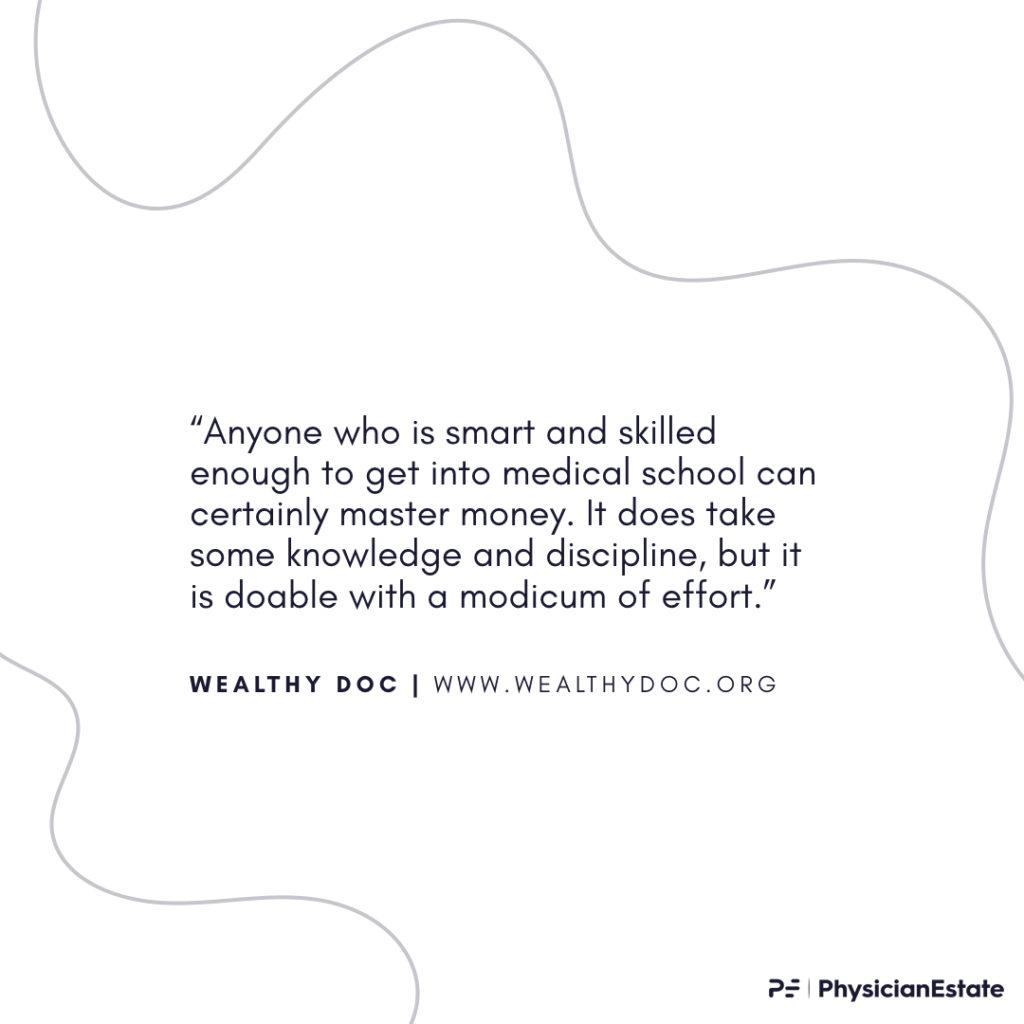Doctors in Finance – Wealthy Doc | Physician Finance Blogger – Interview Blog Post
Doctors in Finance | Wealthy Doc is a well-known and respected physician finance blogger. As fellow physician finance bloggers, we wanted to know more about his experiences in physician financial planning (e.g. selecting financial advisors for physicians, etc.) and his thoughts on the current financial situation due to the global pandemic.
Introduction to Doctors in Finance
On Medical Background
1. Please tell us a bit about your personal story, growing up, medical training, medical practice, and current medical professional involvement.
Mine is a rags-to-riches story. We lived in rural poverty. There were no family members or friends in my world who had a college degree, wealth, or high income.
Thanks to a lot of help from mentors, teachers, public schools, and state and federal funding I received a fantastic education, including a BA, MD, and MBA.
I have worked in academia, private practice, and currently am salaried at a non-profit.
2. What made you develop interest in financial literacy? Motivating factors? Did you pursue any formal financial education/training to be a successful physician finance blogger?
I assume growing up poor, having little, and seeing my father file for bankruptcy influenced me. I did not want to grow up and still be poor like everyone I knew.
Math, stocks, passive income and investing always interested me. I wanted the power of compounding to work for me, not against me.
I published an article and software as a teenager that was reprinted in books around the world. The passive income for years was not much, but it gave me a taste of money coming in without additional work. I never forgot that.
Later, I saw my physician colleagues make a lot of bad money choices. I wanted to avoid that and pursue more formal learning. I worked through my evening MBA over three years while working in medicine during the day.
I kept earning, saving, and investing. At some point I realized my investment income exceeded my paychecks. That felt awesome. It still does.
Doctors in Finance | Wealthy Doc
3. What is WealthyDoc? What is the unique value proposition of WealthyDoc to the doctors in finance? Tell us the story behind its creation.
In 2004 and 2005 I was teaching residents. They were interested in learning more about personal finance and investing. I shared what I could once the word got out of my interest. My department brought in “finance professionals” to help “educate” them. They wore sharp suits and used a slick presentation to build their own income. Some of the students detected the con. They wanted to learn more.
I recommended books. But the residents were exhausted and had minimal free time to read and learn. They asked me if there was a good online source to learn from instead. I scoured the internet but did not find much. Bill Bernstein was writing, but mostly about investing and it was too technical for these residents. So, in 2006 I planned and launched an online site in 2007.
In 2007 I changed jobs and started several clinics. Between building clinics and surviving the financial crisis I was swamped and did minimal updates to my site. I at least created a place where physicians could learn about finance and investing.
Then 4-5 years later Jim Dahle, MD came along. As we all know WCI exploded the niche and proved the viability of my business plan. I revamped my site and basically started from scratch a couple of years ago. I don’t have the abilities or ambitions of WCI.
So, I am not sure what my current “value proposition” is. There are a lot of niches and competition as a business. I mainly want to share what I learned while becoming financially successful as a practicing doctor. Fortunately, I do not need to earn money from the site. That keeps my site with minimal bias and conflicts.
4. How do you help physicians and fellow doctors in finance in the US with money matters? As a physician finance blogger, do you provide any services, courses, coaching, etc?
Online I mostly blog and run the website WealthyDoc.Org
Occasionally I will post a video, get active in social media, be interviewed, etc. I still work as a doctor and am not offering coaching, counseling, or other services.
I am writing a book but have been doing that forever. I do not even like my own writing at this point, but someday may put it out there.
I also give talks to doctors about personal finance, but I limit that due to my other interests. I also prefer to be semi-anonymous.
I want to be an example of a doctor who made a lot of mistakes but came out ahead due to consistency of earning, saving, investing, and growing wealth. It is not rocket science. Every doctor over age 65 should be a millionaire, not 1 in 4.
The Good and Bad for Doctors in Finance
Physician Financial Planning
5. As one of the experienced doctors in finance, what are some of the mistakes you made in your financial journey? If you had to redo the whole journey, what would you do differently?
I have no regrets (or is that No Ragrets?). I follow Nietzsche’s philosophy of Amour Fati. It was as it should be. I suffered plenty of hardships and made stupid mistakes, but all that helped form who I am today.
Philosophy aside, I made hundreds of money mistakes. You do not have enough space on your server for me to list them all. Here are a few examples: not saving enough, going into credit card debt, getting a car loan, investing conservatively in an early bull market, picking individual stocks and selling them after they crash.
6. Share a few very successful financial decisions you have made in your career as a physician finance blogger.
There was no big lottery ticket victory for me. It was high-earning, frugal living, and prudent investing that brought me to Financial Independence.
COVID-19 and Concerns for Doctors in Finance
7. As one of the long-time doctors in finance, is COVID-19 impacting your personal finances, and your brand WealthyDoc?
I do not have much of a marketable brand or online income so no change there. The market value of my portfolio took a big hit. I did not like that, but I did not panic or make changes either. I plan to still work part-time and continue to invest according to my IPS (Investor Policy Statement) and asset allocation.
The job instability and financial hits to health care did not really surprise me. We were lucky in 2007-2008 to be relatively unaffected. But that does not mean our sector is exempt from all rules of business.
I was surprised how much all my “diversified” income streams have taken a hit. I worry about bonds at a time of low interest rates. Stocks crashed and are volatile. Vacancy rates are creeping up in residential real estate. U.S. and foreign economies took a hit simultaneously. Private companies are struggling. My medical office building and surgery center investments are suffering big time.
Fortunately, I still have a job, emergency fund, no debt, and investment income. I should be able to weather the storm. It emphasizes the importance of the basics of personal finance and investing.
8. Many physicians in the US are extremely concerned about asset protection, disability from COVID-19, and loss of pay from COVID-19. As one of the experienced doctors in finance, could you outline any asset protection strategies, disability insurance basics, and financial planning related tips to physicians?
I wrote a post about what I call Pandemic Portfolio Panic. Avoid making big changes right now. Go back to your IPS. Rebalance if needed. Otherwise keep working the plan. Stay the course!
Finance Related Favorites
9. Most doctors in finance have a favorite finance related book. What is yours?
Can I pick two? I have literally read hundreds, so I do not think two is too many!
10. Also, most doctors in finance have a favorite financial investment vehicle. Could you tell us about yours and why? (Stocks vs. Real estate vs. Rare metals vs. Angel investing, etc.)
All the above and more. I am not smart enough to know what will go up or down right now. Plus, Modern Portfolio Theory has a lot to say about adding noncorrelated risky assets to a portfolio. It can boost returns while lowering risk. It is summed up in the word diversification.
11. Favorite physician bloggers and/or doctors in finance
Much like my book list. There are too many to mention.
I skim or read through Feedly most of them on this PhysicianZen list.
Plus, I think I have a new one: PhysicianEstate
As a group this niche has attracted some of the smartest, dedicated, kind, and humble people I have ever met. Going to FinCon feels more like a family reunion to me than a marketing event.
12. Favorite quote
“For what is a man profited, if he shall gain the whole world, and lose his own soul?” KJV, Bible. That reminds me to stay humble, honest, and keep my priorities straight.
Physician Financial Planning and Financial Advisors for Physicians
13. Many physicians often find it tricky to choose a qualified financial advisor/planner who specializes in physician finance planning. Please share your thoughts on how physicians should approach the topic of physician financial planning. We hear stories of how their interests are not aligned with their client’s financial growth. What are the things to watch out for? How to select competent financial advisors for physicians? What qualifications should be considered for physician financial planning? What strategies should be considered for financial planning for physicians?
Conflicts of interest are not just stories. They are the reality for the entire industry. I think most doctors can and should master the basics of personal finance and investing. It is fine to consult a CFP or CFA or CPA occasionally and pay for that professional advice. But you will care more about your money than they will. I pay an hourly rate for the advice I receive from my JD, CFP, CFA, and CPA. Letting them sell me commissioned products or take a percentage of my income or assets would be absurd.
Closing Thoughts
Thanks for this opportunity. I am terrible at marketing my platform, so I relish opportunities to provide connection, education, and encouragement to my peers.
Anyone who is smart and skilled enough to get into medical school can certainly master money. It does take some knowledge and discipline, but it is doable with a modicum of effort.
What is the best way for physicians and/or fellow doctors in finance to reach out to you?
Reach me through my website (WealthyDoc.Org), or Twitter (@Wealthy_Doc).
Here at PhysicianEstate, we welcome all physician entrepreneurs to learn about commercial real estate investments, rental property investments, and wealth generation. We encourage all physicians to eventually become real estate physician investors. We know a great deal about Who – What – Why – How.
Stay in touch with us by signing up for our newsletter. The newsletter will keep you up to speed on the current real estate investments we are looking at, provide physicians with investment opportunities, and much more.
Legal Disclaimer: This is not investment advice. I am not a legal and/or investment advisor. This is my personal blog, and all information found here, including any ideas, opinions, views, predictions, forecasts, commentaries, suggestions, or stock picks, expressed or implied herein, are for informational, entertainment or educational purposes only and should not be construed as personal investment advice. These are my views, it is not a production of my employer, nor is it affiliated with any broker/dealer or registered investment advisor. While the information provided is believed to be accurate, it may include errors or inaccuracies. To the maximum extent permitted by law, PhysicianEstate disclaims any and all liability in the event any information, commentary, analysis, opinions, advice and/or recommendations prove to be inaccurate, incomplete or unreliable, or result in any investment or other losses. You should consult with an attorney or other professional to determine what may be best for your individual needs. Your use of the information on the website or materials linked from the Web is at your own risk.




